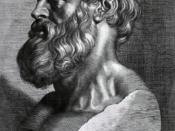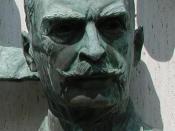The Austrian surgeon, Theodor Billroth (1829-1894), is generally regarded as the founding father of modern abdominal surgery. The Austrian physician, Karl Landsteiner (1868-1943), is noted for his development in 1901 of the modern system of classification of blood groups. In early 1840s surgery began to change dramatically in character with the discovery of effective and practical anesthetic chemicals such as ether and chloroform. And cases related to the appendix opened doors to abdominal surgeries allowing causes to become discovered and ways to performing better surgeries. These contributions were directly the landmarks in the development of surgery.
Historically, the earliest known surgical procedure was trepanation, in which a hole is drilled into the skull leaving the membrane around the brain intact. It has been carried out for both medical reasons and mystical practices for a long time, dating back to Hippocrates who even gave specific directions on the procedure from its evolution through the Greek age.
The Edwin Smith papyrus is the oldest known surgical text, dating back to the 1600s BC. Today, this is an ancient Egyptian textbook on surgery, and describes in exquisite detail the examination, diagnosis, treatment, and prognosis of numerous ailments. Surgeons are now considered to be specialized physicians, although initially physicians and surgeons had different historical roots. For example, the Hippocratic Oath warned physicians against the practice of surgery. By the 13th century, many European towns were demanding that physicians have several years of training before they could practice. And during that time, surgery had a lower status than pure medicine. Among the first modern surgeons were battlefield doctors who were primarily concerned with amputation. In the 18th century, five main surgeries were laid out by Bell: Aneurysm, Amputation, Bladder stone, Trepanation, and Hernia. All of these do not require the opening of the abdomen/chest as...


